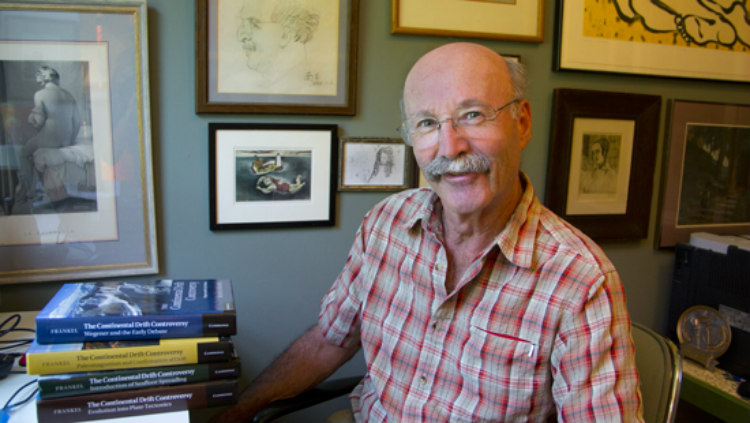The recent death of Henry R. Frankel, Ph.D., who was known as “Hank” to his friends, has left a void for those who knew him. Passionate and enthusiastic about his family, his research and his students during his 43-year career at UMKC, Frankel’s legacy will continue to enhance the university through a new scholarship.
“Hank Frankel is the most accomplished and influential scholar the philosophy department at UMKC has ever had,” says Bruce Bubacz, Ph.D., Frankel’s friend and colleague. “His extraordinarily complete and extensive research into the controversy over the acceptance of continental drift and plate tectonics must be examined and understood by anyone who is studying that subject.”
Frankel devoted much of his professional life to studying the theory of continental drift, which was initially received with skepticism.
“In 2012, Cambridge University Press published his four-volume work, ‘Continental Drift Controversy: Wegener and the Early Debate,’” Bubacz says. “It was the culmination of a distinguished 40-year research career and has brought recognition to our university among philosophers and historians of science as well as Earth scientists and physicists.”
Frankel called the work a “romance,” referring to its emotion, imagination, heroism, mystery and adventure. The volumes are considered the definitive work on continental drift and plate tectonics in the field of Earth science.
Bubacz notes that the verification that the continents were not stationary was revolutionary.
“The plate tectonics revolution changed Earth science as profoundly as the Copernican revolution changed astronomy and the Darwinian revolution changed biology,” he says.
Beyond Frankel’s groundbreaking work, he was a remarkable human being. Bubacz says that he was one of the first professors to “flip the classroom” by posting his notes online and devoting class time to discussion and debate. His family remembers that his passion for teaching and his excitement about science and philosophy were obvious to his students.
“He could be loud and enthusiastic when teaching, walking back and forth in front of the class, talking excitedly,” says Johanna Comes, Frankel’s daughter. “It was as if he hoped that through his genuine excitement for the subject, his students would become genuinely excited for the material also. And his delight for teaching wasn’t just with college students. One year, he came to my grade school class to give a talk about basic logic. He brought logic workbooks for the kids and he worked through some problems with us. I don’t know if he inspired any kids to become future philosophers, but it was cool that he took time to do that.”
Comes says that her father expected students to work hard, but he genuinely wanted them to succeed. She remembers that he committed himself to working with students who struggled with the subject matter as long as he could see they were trying. Her sister, Nora Frankel, agrees.
“My dad always wanted his students to succeed,” she says. “I think his dedication to education was apparent in not only the way he treated his students, but also how he was an educator at home, both with me and my sister and his granddaughters.”
Paula Frankel, Frankel’s wife of 50 years, witnessed his extra efforts to help students who were interested in undergraduate or graduate degrees in philosophy. She and her children are proud that the Henry R. Frankel Scholarship in philosophy will recognize his efforts.
“In a way, this scholarship is just a continuation of that help,” she says. “I think he, and I know his family, are proud to have this established in his name.”
Henry Frankel signed his correspondence, “Joy, Hank.” The Henry Frankel Scholarship in philosophy will continue the sentiment of his parting wish for future scholars in the field.
For more information about scholarships, please contact Financial Aid and Scholarships.

